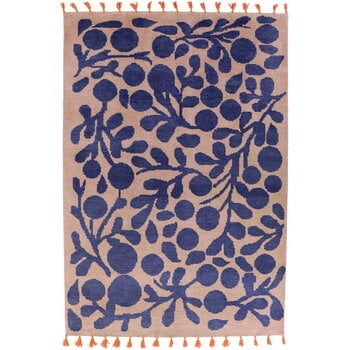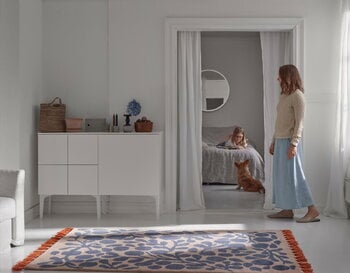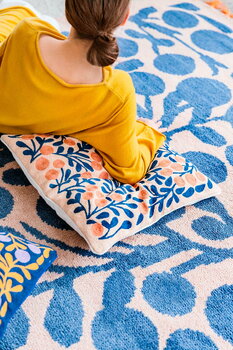The Terttu rug, designed by Eri Shimatsuka for Finarte, reflects the atmosphere of Finnish forests, home to an abundance of wild berries. Hand-knotted from New Zealand wool, the rug is a fascinating combination of luxurious materials and a distinctly bohemian pattern finished with colourful fringes. The Terttu rug celebrates the 100th anniversary of Finnish-Japanese diplomatic relations, drawing inspiration from themes valued in both countries: nature, traditional handcrafts and the beauty found in everyday life.
Terttu rug, beige
Finarte
Description
The Terttu rug, designed by Eri Shimatsuka for Finarte, reflects the atmosphere of Finnish forests, home to an abundance of wild berries. Hand-knotted from New Zealand wool, the rug is a fascinating combination of luxurious materials and a distinctly bohemian pattern finished with colourful fringes. The Terttu rug celebrates the 100th anniversary of Finnish-Japanese diplomatic relations, drawing inspiration from themes valued in both countries: nature, traditional handcrafts and the beauty found in everyday life.
Product details (8)
- Material
- 70% wool, 30% cotton (base)
- Colour
- Beige, dark blue
- Length
- 220–240 cm
- Width
- 140–170 cm
- Yarn height
- 7 mm
- Weight
- 8.8–13.3 kg
- Notes
- Custom sizes available through our Customer Service (max. 300 x 900 cm).
- Care instructions
- Vacuum gently, do not rub. Professional cleaning.
- Product ID
Designer
Eri Shimatsuka is a Tokyo-born textile designer who moved to Finland in 2007. Shimatsuka has studied textile art at Helsinki’s Aalto University, and worked for brands such as Marimekko and Lapuan Kankurit. Besides print design, her work includes illustrations, book projects and translations.
View all productsReviews (2)
4.5
Based on 2 reviews
-
A
Anna J
Jättefin! Mjuk matta, fina färger och bra kvalité.
148 days ago
-
V
Valerie S
La Tour-de-Peilz, Switzerland
72 days ago
Sustainability
The Product Sustainability Framework, our criteria of sustainable design, helps you find the most sustainable products in our selection. Read below which sustainability criteria this product has met.
Working conditions & labour 7/9
-
Equal opportunities for all employees
-
Commitment to UN Global Compact, fair compensation for all employees
-
Corporate responsibility requirements defined and communicated for suppliers
-
Systematic work for improved inclusion and well-being in the workplace
-
Transparent supply chain
-
Suppliers' compliance to a code of conduct ensured
-
Support for community involvement in the supply chain
-
Direct suppliers audited and certified
-
Compliance to the UN Guiding Principles on Business and Human Rights ensured in the supply chain
Eco-friendly production 6/9
-
Fair and resource-wise water-use in production
-
No incineration or landfilling of returned items
-
No use of endangered species as materials
-
No direct environmental emissions or waste (excl. GHGs) from production
-
Material-efficient and ecological packaging
-
No potentially harmful chemicals used in own production
-
The sustainability of direct suppliers' production is addressed and monitored
-
Production and material sourcing that respect biodiversity, animal rights, and natural ecosystems
-
Positive impact on nature’s well-being through operations that regenerate natural ecosystems
Climate impact 4/8
-
Company's direct greenhouse gas emissions identified and commitment to reduction
-
Product's carbon impact identified and commitment to reduction
-
Guidance on energy- and eco-efficient use of the product
-
Carbon footprint of the product calculated and goals set to reduce it
-
Contribution to climate initiatives beyond the brand’s direct operations
-
Low-carbon or compensated transportation
-
100 % renewable energy in own production and operations
-
Carbon neutral or carbon negative product
Sustainable materials 5/6
-
Sustainable and long-lasting material choices
-
No harmful or hazardous substances
-
Responsible raw material sourcing and production
-
Materials suited for circularity: monomaterials, recyclable finishings, renewable or recycled contents etc.
-
Ecological materials: natural, biodegradable, recyclable or recycled contents
-
Outstanding materials in terms of innovativeness, responsibility, sustainability and circularity: local production or sourcing, 100 % recycled content, C2C-certification etc.
Circular design 5/5
-
High aesthetic quality promoting long-term use of the product
-
Technically durable product design and material choices
-
Design for enduring life-long quality
-
Design and support for product maintenance, repair and upgradability
-
Innovative circular design solutions: circular service system, resale platform, remanufacturing, collection of used products, etc.









